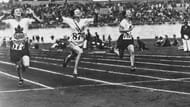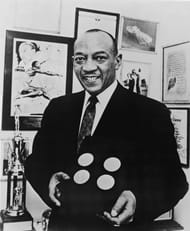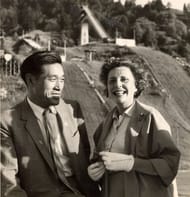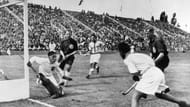Following the Olympics in Los Angeles, the quadrennial event returned to Europe. Like Amsterdam, the Berlin Games were a revolution.
If Amsterdam introduced the standard Olympic tracks and the Olympic cauldron, Berlin in 1936 brought the iconic torch relay. For the first time, the games were televised, with radio broadcasts in more than 41 countries. Leni Riefenstahl, the iconic German filmmaker, made an entire movie that featured the events of the game, titled Olympia.
Though the Games had an ulterior motive, it did not succeed. Perseverance, humanity and the Olympic spirit succeeded above all. These Games saw the return of an American champion named Betty Robinson. Once taken for dead and almost buried, she was later found alive, though she missed the Los Angeles Olympics. However, she returned in style for the Berlin edition. Against all odds, she gave the U.S. a gold medal in the 4 x 100 m women's relay team.
Betty Robinson was not the only heroine. The Berlin Games also saw the rise of the iconic champion Jesse Owens. He was the first African American track and field athlete to win four Olympic gold medals in one edition. He won the 100 meters, 200 meters, long jump and Men's 4 x 100 meter relay. The legendary anecdote between Jesse and the silver medalist German jumper Luz Long remains popular to this day.
The Berlin Games affirmed the supremacy of Indian hockey. Under the captaincy of Dhyan Chand, India won the 3rd consecutive gold medal. They thrashed Germany 8-1 in the finals. Major Dhyan Chand's game impressed even Adolf Hitler. Some say he was even offered a position in the German army. However, the 'Wizard of Hockey' politely but firmly refused.
Here are some more interesting facts about the Berlin Olympics.
#1 The first Olympics to be filmed and televised

The Berlin Olympics was another revolution, despite the stigma attached to the era. For the first time, the Olympics was broadcasted live. The radio broadcast reached 41 countries, a record for the time. The Olympics was filmed as well, and the film, Olympia, was a huge hit. The techniques used by filmmaker Leni Riefenstahl were a revolution in filming sports.
Amsterdam Olympics introduced the tradition of lighting the Olympic cauldron. However, Berlin spiced it up by reintroducing the iconic torch relay. The Olympic torch was lit in Athens and taken to the host city, Berlin. For once, even Kabaddi was a demonstration sport at the Olympics.
The Berlin Olympics had a funny beginning though. When the doves were released, a cannon was simultaneously shot. The doves were scared and their droppings fell on the spectators!
#2 Betty Robinson's victory

Betty Robinson's journey to the Berlin Olympics was phenomenal, perhaps equaled only by Wilma Rudolph, who arrived much later.
Betty Robinson made her Olympic debut at the Amsterdam Olympics. She won the first ever Olympic race for women's 100 meters. She was also part of the 4x100 meters relay team that won silver. Betty came back to Berlin to win the top honors.
So, what's special about her return? In 1931, Betty Robinson was involved in a plane crash. She was initially declared dead. However, it was later discovered that she was alive, though in a coma. It was another six months before she could get out of a wheelchair, and two years before she could walk normally again. Meanwhile, she missed the 1932 Summer Olympics in her home country.
Betty Robinson qualified for the American team for the 4 × 100 meters relay at the 1936 Summer Olympics. Initially, they were behind the heavily favored Germans. However, in a stroke of luck, the Germans dropped the baton altogether. Robinson took the lead and handed off the baton to Helen Stephens, and USA won the gold. Betty retired in style.
#3 Jesse Owens, the Olympic legend

The Olympics in Berlin was perhaps less of a sporting event, and more of a display of personal supremacy. However, one man had different ideas. His simplicity changed the entire equation.
Jesse Owens was the athlete. Born into a politically disarrayed U.S.A., Owens had a knack for running. He was discovered by Larry Snyder, an ex-American athlete whose Olympic hopes were ruined in an airplane crash.
Owens braved discrimination to make it to Berlin. He won four gold medals in the 100 meters, 200 meters, long jump and men's 4 x 100 meters relay, a record for any African American athlete at the time. His gold medal in the relay race was a world record as well.
His friendship with the German long jumper Luz Long is still considered the epitome of sportsmanship. Long advised him to jump from a distance. The way Jesse thanked him, in the face of many adversities, is the tale of legends.
#4 Sohn Kee Chung - the only Asian marathon champion ever

The Berlin Olympics saw the rise of Sohn Kee Chung. He was the first to break the European domination in marathons.
This was the age of empires. While India was ruled by the British, Korea was under the Japanese Empire. Though he hailed from the Korean peninsula, Sohn Kee Chung was compelled to compete under the name Son Kitei, adhering to Japanese name traditions.
Sohn Kee Chung was a talented runner. A medal favorite in Berlin, he smashed the world record for the marathon in 1935. He won the gold in 2 hours, 29 minutes, 19.2 seconds, breaking the then Olympic record. His Korean teammate Nam Sung-yong took the bronze medal.
Sohn had his revenge. He refused to acknowledge the Japanese anthem played at his award ceremony. When Dong-a Ilbo , a Korean newspaper, published a photograph of Sohn at the medal ceremony, it altered the image to remove the Japanese flag from his running tunic. The paper's publication was suspended for nine months.
#5 India completes hat-trick of gold medals in field hockey

The Berlin Olympics also witnessed India's golden hat-trick in field hockey. Though still competing as a British colony, India had mesmerized the world with their skills. What America was to basketball, India was to hockey.
Dhyan Chand, the 'Wizard of Hockey', was the skipper of the team. Though the team suffered a setback from Germany in the practice matches, they quickly recovered. India thrashed every team black and blue until the finals.
When they met, India were initially unable to score for the first half hour. Germany had a rough-and-tough game. Some say Dhyan Chand was injured. However, India was up to the challenge and whacked the Germans in their own backyard.
Even though Germany scored a goal, it was nothing in front of the Indian onslaught. Dhyan Chand scored at least 3 goals, while Ali Dara scored two as India thrashed Germany 8-1.
Legend has it that Dhyan Chand's game impressed Adolf Hitler himself. He personally invited him for a chat, and offered him a place in the German army, with a proper rank. Dhyan Chand politely refused the offer. Hitler was left embarrassed.
